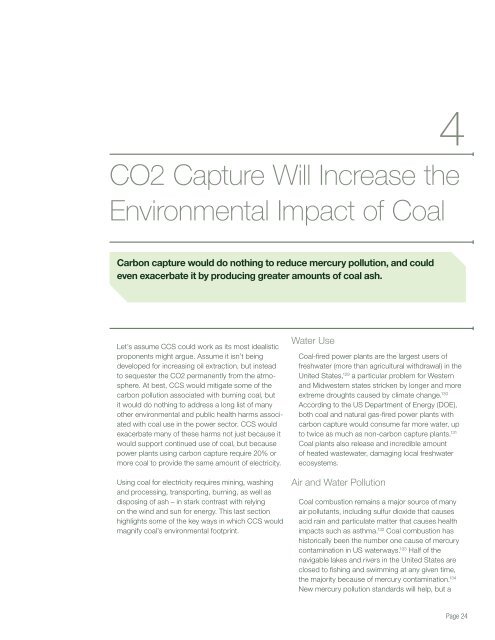CO2 Capture Will Increase theEnvironmental Impact of Coal4Carbon capture would do nothing to reduce mercury pollution, and couldeven exacerbate it by producing greater amounts of coal ash.Let’s assume CCS could work as its most idealisticproponents might argue. Assume it isn’t beingdeveloped for increasing oil extraction, but insteadto sequester the CO2 permanently from the atmosphere.At best, CCS would mitigate some of thecarbon pollution associated with burning coal, butit would do nothing to address a long list of manyother environmental and public health harms associatedwith coal use in the power sector. CCS wouldexacerbate many of these harms not just because itwould support continued use of coal, but becausepower plants using carbon capture require 20% ormore coal to provide the same amount of electricity.Using coal for electricity requires mining, washingand processing, transporting, burning, as well asdisposing of ash – in stark contrast with relyingon the wind and sun for energy. This last sectionhighlights some of the key ways in which CCS wouldmagnify coal’s environmental footprint.Water UseCoal-fired power plants are the largest users offreshwater (more than agricultural withdrawal) in theUnited States, 129 a particular problem for Westernand Midwestern states stricken by longer and moreextreme droughts caused by climate change. 130According to the US Department of Energy (DOE),both coal and natural gas-fired power plants withcarbon capture would consume far more water, upto twice as much as non-carbon capture plants. 131Coal plants also release and incredible amountof heated wastewater, damaging local freshwaterecosystems. .Air and Water PollutionCoal combustion remains a major source of manyair pollutants, including sulfur dioxide that causesacid rain and particulate matter that causes healthimpacts such as asthma. 132 Coal combustion hashistorically been the number one cause of mercurycontamination in US waterways. 133 Half of thenavigable lakes and rivers in the United States areclosed to fishing and swimming at any given time,the majority because of mercury contamination. 134New mercury pollution standards will help, but aPage 24
© Les Stone / Greenpeace © Les Stone / Greenpeace © Les Stone / Greenpeacesignificant amount of mercury pollution drifts into theUnited States from coal combustion in other countriessuch as China. 135 Carbon capture would do nothing toreduce mercury pollution, and could even exacerbateit by producing greater amounts of coal ash.In addition, drinking water is contaminated by everypart of the coal waste stream with chemicals andcompounds that cause cancer, birth deformities,and other health issues. 136 This is because the coalindustry’s contribution to pollution in our rivers, lakes,and seas includes a laundry list of toxic chemicalsand compounds, such as cyanide, arsenic, selenium,ammonia, sulfur, sulfate, nitrates, nitric acid, tars,oils, fluorides, chlorides, and other acids and metals,including sodium, iron, thallium, cadmium, beryllium,barium, antimony, and lead. 137Toxic Coal AshCoal plants using carbon capture will produce morecoal ash because the technology requires power tooperate – 20 to 30% of the coal ash generated perkilowatt hour would be related to carbon capture. 138After mining waste, coal ash is the largest wastestream in the country, as it is in other countries likeChina. 139Coal ash is laden with other cancer-causing chemicalsand heavy metals, and most coal ash producedin recent decades sits in unlined ‘ponds’ that continuouslyleach into groundwater. 140 Coal ash containmentis so negligent that massive quantities have spilledon multiple occasions, contaminating rivers and evenwiping out nearby communities. 141 In one infamouscase in 2008, 1.1 billion gallons of coal ash slurry(more than oil spilled from the Exxon Valdez) spilledfrom its containment near the TVA Kingston FossilPlant in Tennessee, forcing evacuations from thetown. 142 While new regulations on non-climate airpollutants will lead to cleaner air, it also means coalash will become more toxic. 143In the United States, coal ash has never beenregulated federally even though the problem crossesstate boundaries, and most states have poor or noregulations on coal ash. 144 The TVA Kingston disasterprompted EPA to consider regulations in 2009, butdecided six years later to provide a coal ash guidancein lieu of enforceable standards. 145Public Health and the EconomyCoal has a giant, negative impact on the economy.For instance, coal transport has traditionally dominatedUS rail capacity. In the United States, transportingcoal has been responsible for a quarter of thecarloads and half of the tonnage carried by train,although this has fallen in recent years with decliningcoal demand. 146 Coal trains can spill toxic dust alongtheir path, can catch fire spontaneously, and generallyget in the way of using railways for public transportationand transporting other commodities. 147 Industryplans to build new export terminals in the PacificNorthwest, threatening to increase its already massivefootprint on transportation infrastructure. 148Adding up the monetized life cycle costs of coal usedfor electricity, such as health costs from its pollutionand environmental cleanup, comes to as much as$523 billion per year in the United States on top ofthe price of electricity – $308 billion if climate-relatedcosts are excluded. A 2010 Harvard study assessedthe costs of coal pollution that result from lost workhours and lowered productivity due to varioushealth conditions, including mental retardation (frommercury), cancer, cardiovascular disease, black lungand other pulmonary diseases, transport fatalities,asthma, and early death. While the study admittedthe true ecological and health costs are worse, itconcluded that “[a]ccounting for the many externalcosts over the life cycle for coal-derived electricityconservatively doubles to triples the price of coal perkWh of electricity generated.” 149Carbon Capture Scam Chapter: 4Page 25


